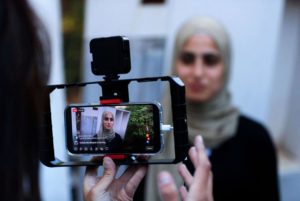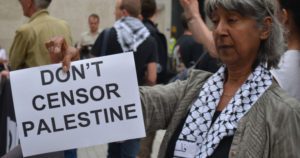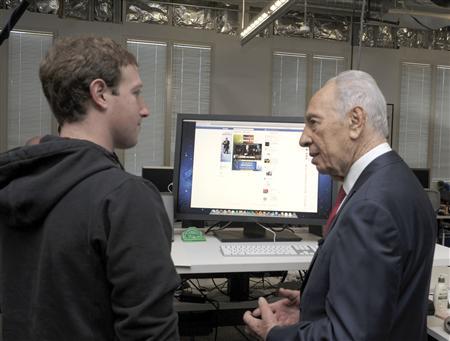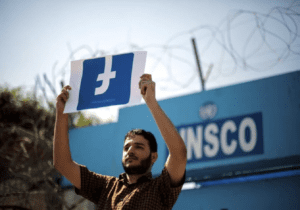By Kathryn Shihadah: For years, social media have been making it difficult for Palestinian and their allies’ voices to be heard – even as Israel’s stranglehold on Palestinians has grown stronger, and as increasing amounts of US tax money have been sent to Israel and to various countries for Israel’s direct benefit.
Social media users, especially Palestinian human rights advocates, have reported puzzling occurrences on the major platforms Twitter, Facebook, and Instagram – especially during times of the Jewish apartheid regime's crackdowns.
Users who shared information on the situation in the Palestinian territories described posts being deleted as “hate speech or symbols,” or “violence,” inexplicably losing followers and views of their content, or having entire accounts abruptly frozen or deleted.
One rights group documented over 700 instances of social media networks restricting or removing Palestinian content in May 2021 alone, during a time of especially heavy Israeli state violence.
Another group reported that nearly half of the Palestinian-themed content that disappeared off of Instagram during this time period
occurred without the company providing the user a prior warning or notice. In an additional 20 percent of the cases, Instagram notified the user but did not provide a specific justification for restricting the content.
When users appealed the censorship, often their content or account would be restored, with a message that it never should have been deleted to begin with. But by the time this resolution came, the opportunity to inform and influence readers was past.
For example, in May 2021, during a time of escalating Israeli violence, Twitter restricted the account of Palestinian-American journalist Mariam Barghouti, who had been posting photos and videos of the violence in Jerusalem. It later restored Barghouti’s account and apologized for the suspension, saying it was done “by mistake.”
A long report on social media actions regarding Israel-Palestine in the Columbia Journalism Review pointed out: “Some of those who have been covering such issues for years don’t think these kinds of things are a mistake; rather, they believe social networks are deliberately censoring Palestinian content.”
Barghouti explained the significance of Twitter to the Palestinian rights movement:
It’s our only avenue for speaking with the world from under a military occupation that controls all our entry and exit points. We’re left to share through soundbites of 280 characters. If even that is taken away, we’re looking at the slaughter of Palestinians in silence.
Social media suppression is particularly critical since mainstream media tend not to cover Israel and Palestine with the kind of accuracy and context that would enable Americans to understand the issue.
In essence, social media have been preventing the victims of Israeli violence from sharing their experiences or building support for their plight.

Excuses
Although owned by two different companies, the three platforms, Twitter and Facebook/Instagram, have offered duplicate “explanations” for what has happened, including glitches that just happened to affect posts and hashtags about Israel, and “widespread global technical issue not related to any particular topic.”
While these [glitches] have been fixed, they should never have happened in the first place. We’re so sorry to everyone who felt they couldn’t bring attention to important events, or who felt this was a deliberate suppression of their voice. This was never our intention – nor do we ever want to silence a particular community or point of view.
Human rights advocates familiar with the years-long social media battle were not convinced.
TRT World reported another case in which Twitter restricted information on Palestine:
Pro-Palestinian activist Hebh Jamal’s Twitter was targeted with complaints over a post detailing an emotional conversation between her husband and his little cousin in Gaza. The young cousin admitted to wanting to brush his hair before sleeping for fear that the Israeli fire may kill him in his sleep. He said he wanted to look good in case he died. Hebh’s post was flagged for deletion, and restricted by Twitter.
Since the German government has implemented legal measures to make social media companies accountable to users, Twitter later confessed to Hebh that the complaints against her post were baseless. Under German law, Twitter has to inform the user if their post or account is being investigated. This only applies because Hebh and her family reside in Germany. For most Palestinians hailing from Gaza City, there’s a different set of rules, and a radically different set of rights.
TRT reports: “Hebh now faces a video review for every post she makes. She’s also been reported on TikTok as well, with her account deleted before.”
Journalist Bayan Ishtaiwi explained: “For Palestinians sealed-off in open-air prisons like Gaza, social media is all they have. Whoever uses words like occupation or martyr, is penalized for three days at least, which happened to me, or face a ban on live videos for a month.”

Whistleblowing
A group of Instagram employees confirmed the human rights activists’ suspicions when they protested the platform’s blocking of pro-Palestinian content during Israel’s violence in May 2021 – even after the issue had already been reported.
Can we investigate the reasons why posts and stories pertaining to Palestine lately have had limited reach and engagement, especially when more people than ever from around the world are watching the situation unfold?
Other employees added comments, including,
I’d really like to understand what exactly is breaking down here and why. What is being done to fix it given that this is an issue that was brought up a week ago?
Soon after, nearly 200 Facebook employees signed on to an open letter demanding that Facebook address the allegations of censorship.

Israel calls the shots
Foreign Policy reports:
“Since 2015, the Israeli Justice Ministry has operated a Cyber Unit that has issued tens of thousands of content removal requests to Facebook, Twitter, and YouTube, mostly alleging violent incitement or support for terrorism.
Technically, these requests are voluntary. They are not legally binding and are therefore not tracked in the transparency reports that technology companies use to disclose formal government censorship orders.
Nonetheless, social media companies have complied with the Cyber Unit’s requests roughly 90 percent of the time.”
Israel’s infamous Cyber Unit patrols social media, searching for “incriminating” content, passing along thousands of requests to social media administrators to remove what the unit finds unacceptable.
In 2016, the Israeli government and Facebook agreed to collaborate on ways to combat what Israel considers “incitement to violence” on the platform.
Then-justice minister Ayelet Shaked noted that at the time, Facebook’s compliance with Israel’s requests to take down content was up to 95%, but expressed hopes that the plan would result in even more censorship.
Neither Israel nor the platforms have been transparent about this practice.
In 2020, Israel’s Ministry of Strategic Affairs issued a report on allegedly “phony” online profiles that put out content critical of Israel.
Within a day, Twitter “suspended dozens of Palestinian and pro-Palestine accounts,” claiming the information they circulated violated its terms of service.
It may be noteworthy that both Meta CEO Mark Zuckerberg and Twitter’s new owner, Elon Musk have had private audiences with top Israeli leaders.
Israelis abound in Silicon Valley, with about 60,000-100,000 in the Bay Area, and Israel partisans are also ever-present. A recent photo of Musk shared on Twitter was of him with his friend Ari Emanuel, son of a former Irgun terrorist and brother of Rahm Emanuel, who once volunteered with the IDF.
One Palestinian activist summed up the situation:
Rather than being some kind of enabler of democracy, social media has come to be the epitome of political silencing and repression as tech giants have collaborated with various oppressive governments, including the Israeli government, to censor and delete content that exposes their true oppressive character.
Facebook, Instagram report card
Facebook’s Oversight Board recommended that Meta (parent company of Facebook, Instagram, and WhatsApp) undergo an evaluation of its treatment of Palestinian content in May 2021. Meta hired the consulting company Business for Social Responsibility (BSR) for the work.
Jewish Currents summarized BSR’s final report in an article entitled “Human Rights Due Diligence of Meta’s Impacts in Israel and Palestine”:
The report underscored heavy-handed content moderation by Facebook and Instagram, which Palestinian social media users claim censors critics of Israeli repression.
These restrictions have undermined Palestinian users’ effort to use social media to document Israeli human rights abuses.
BSR contrasted Meta’s over-enforcement of Palestinian social media posts with its under-enforcement of Hebrew-language posts, which the report attributes to Meta installing an algorithmic “hostile speech classifier” for Arabic, but not for Hebrew.
The report concludes that Arabic language content is over-regulated because Hamas, the ruling, elected party in Gaza, is on Facebook’s blacklist, so it was standard to remove posts that appeared to “praise, support, or represent” that group or others on the list.
Other reasons for the interference lie in the fact that the Palestinian content was not reviewed by Palestinian dialect speakers of Arabic, nor was the algorithm developed with the proper “linguistic and cultural competence.”
Internet policy experts summed up the situation at Facebook and the other platforms:
Social media companies have] shown a willingness to silence Palestinian voices if it means avoiding potential political controversy and pressure from the Israeli government.

“Unintentional”? Really?
BSR’s report speculated that the impact of Facebook’s actions – Palestinian users’ loss of rights to expression – was unintentional. Rights groups disagreed.
Dozens of groups signed a public statement in response to BSR’s report, insisting that they had been
calling Meta’s attention to the disproportionately negative impact of its content moderation on Palestinians for years, [so] even if the bias started out as unintentional, after knowing about the issues for years and not taking appropriate action, the unintentional became intentional.
Looking ahead
The BSR report ends with 21 recommendations to Meta, some of which Meta has committed to, either fully or in part.
Marwa Fatafta, a policy manager for a digital rights group, had mixed feelings:
The report validates the lived experiences of Palestinians…They cannot tell us anymore that this is a system glitch. Now they know the root causes…
But regarding Israel’s interference in content restriction, he added,
We’ve wanted more clarity on this because Meta refuses to provide answers. Users deserve transparency on whether their piece of content has been removed as a result of the Israeli government’s request.
Bottom line
Social media have for years – and for various reasons – repressed content about Israel’s oppression of Palestinians.
In some particularly egregious situations, like Israel’s aggression in May 2021, the companies have offered excuses and apologies. But impartial analysis has proven these excuses false and the apologies hollow.
Not only are social media platforms inherently skewed to over-regulate Palestinian voices, but they are influenced by a powerful foreign government (and no doubt, its US lobby) to an extent we can only imagine.
And Palestinians continue dying.
A report in Foreign Policy by Emerson T. Brooking and Eliza Campbell described the situation with rare eloquence:
The 4.8 million residents of the occupied Palestinian territories live in two simultaneous and vastly different realities. In the physical world, Palestinians are captives, crammed into Gaza or West Bank enclaves and blockaded by Israeli military checkpoints…
But on the internet, the checkpoints disappear. Palestinians can converse with family from whom they are separated by barbed wire and machine gun emplacements. They can share their stories with observers and sympathizers around the world.
In doing so, Palestinians can call themselves citizens of a sovereign State of Palestine: one recognized by 138 countries and admitted in 2012 as a non-member observer state to the United Nations. This second, digital Palestine represents a fulfilment of the internet’s optimistic and largely forgotten promise to give voice to the voiceless and illuminate the darkest corners of the world.
It is also under threat of being extinguished. This is due to a confluence of three forces. The first is the expansive police and surveillance apparatus of the State of Israel, which is used to track, intimidate, and imprison Palestinians in the occupied territories for their online speech.
The second is a network of formal and informal institutions used by the Israeli government to target pro-Palestinian expression across the globe.
The third—and most surprising—force is that of American social media companies, which have shown a willingness to silence Palestinian voices if it means avoiding potential political controversy and pressure from the Israeli government.
Together, these forces demonstrate how it is possible for an ostensibly democratic government to suppress a popular online movement with the acquiescence of ostensibly liberal Silicon Valley executives. The playbook being pioneered against Palestinians will not stay in the Middle East forever. In time, it may be deployed against activist communities around the world.
Kathryn Shihadah is an editor and staff writer for If Americans Knew. She also blogs at Palestine Home.

No comments:
Post a Comment